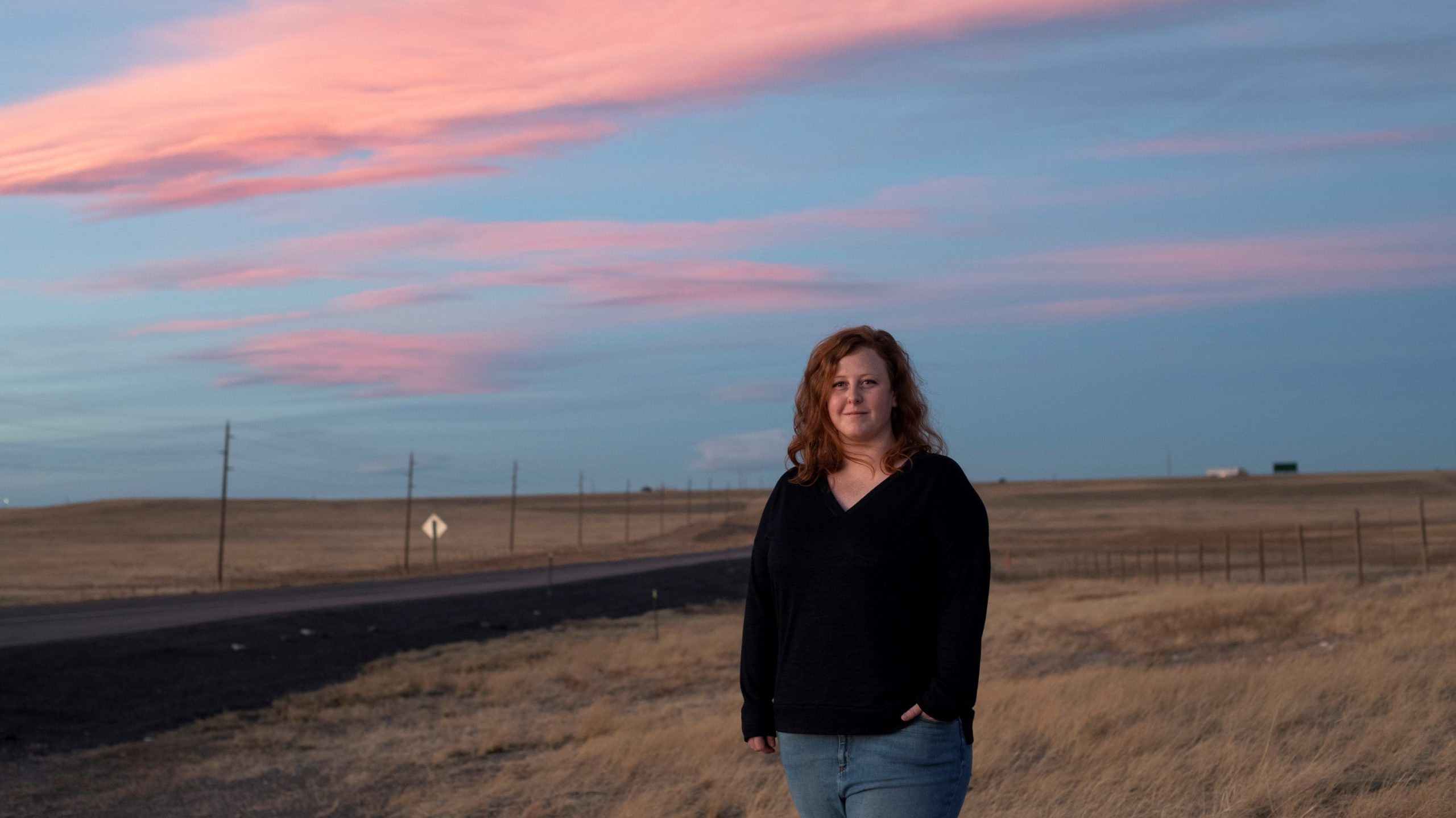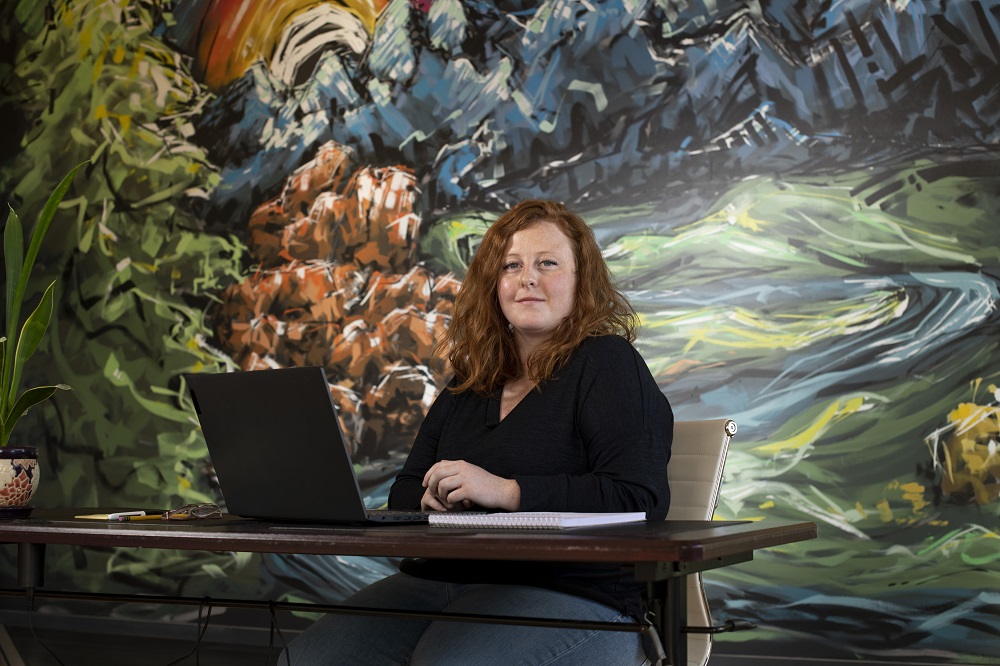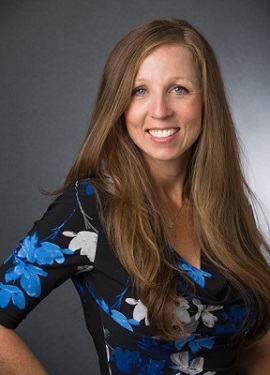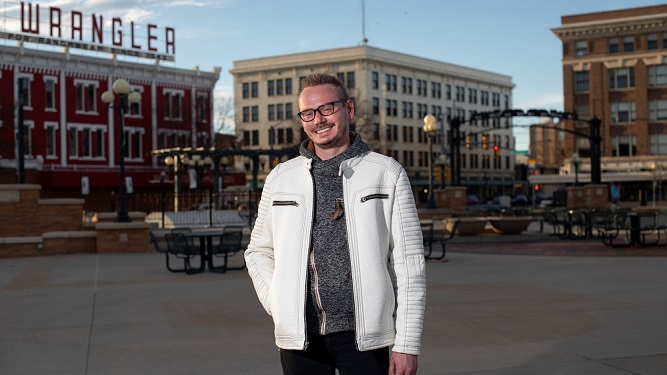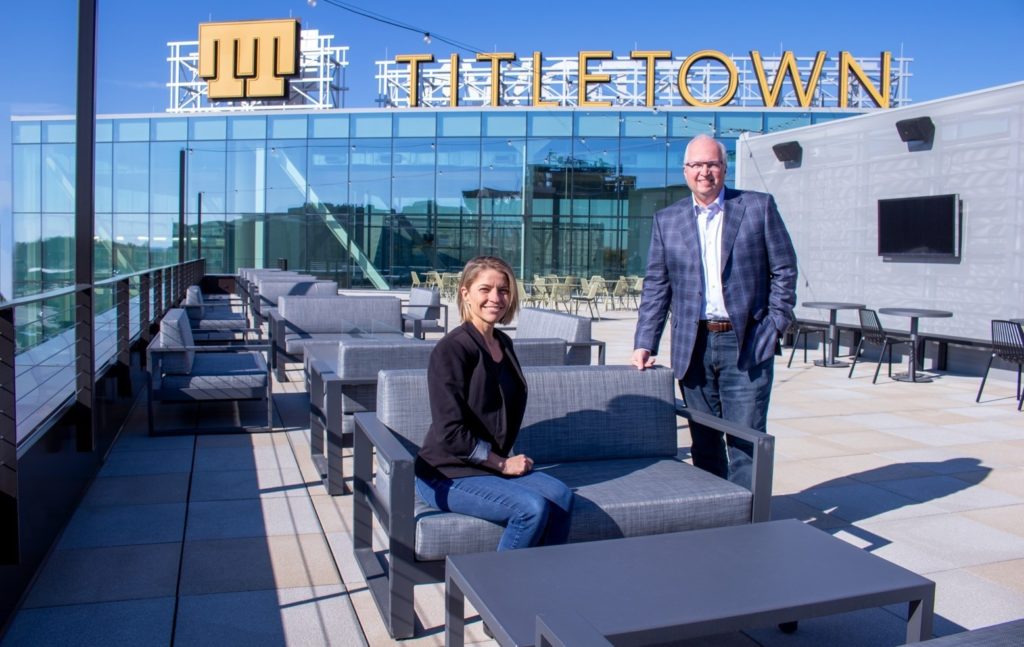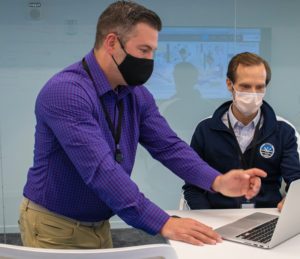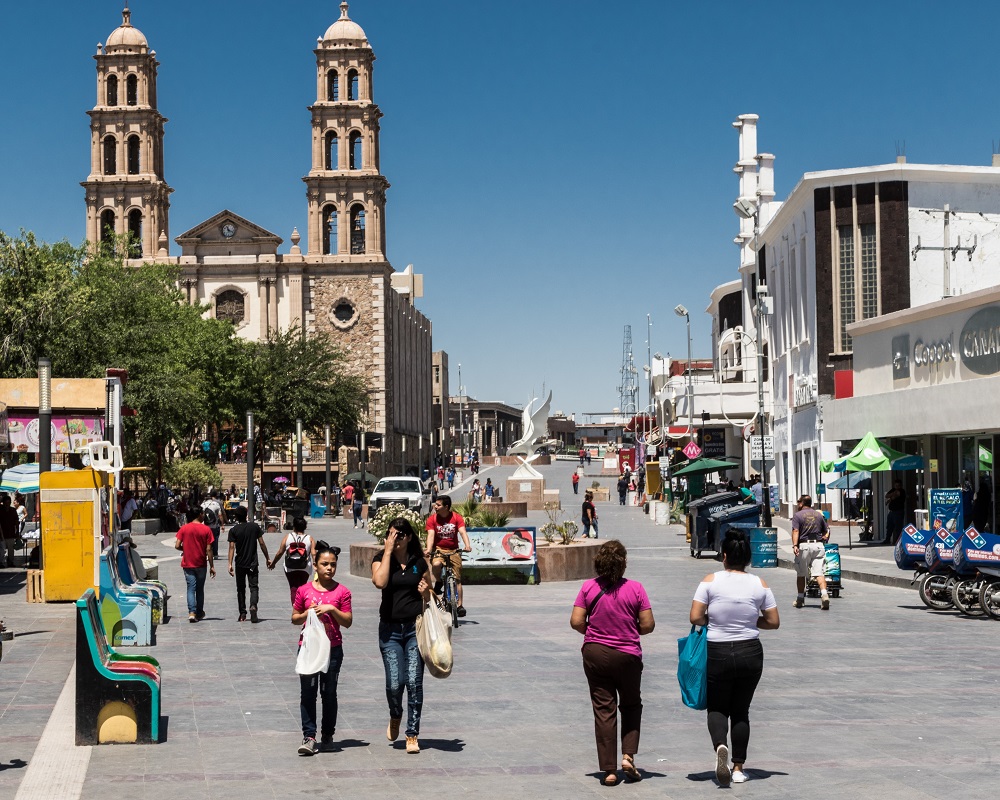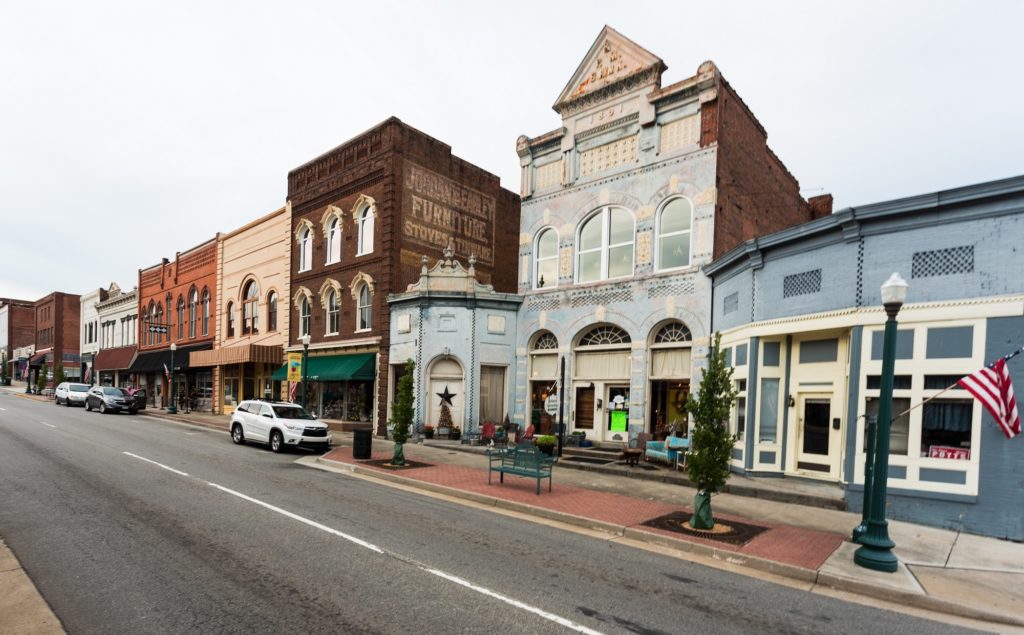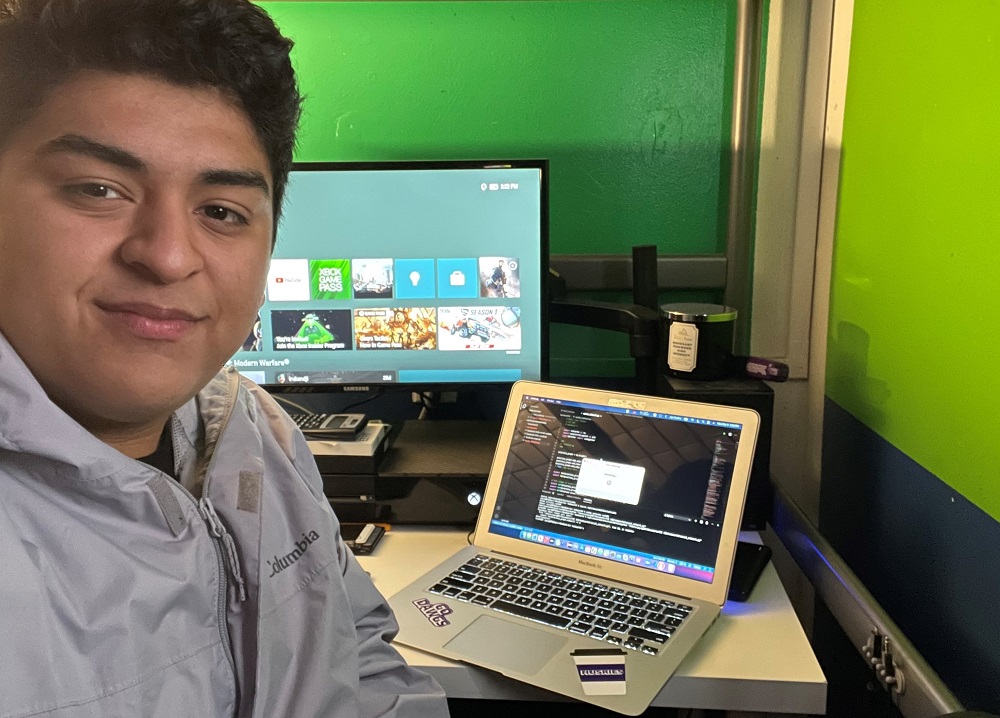Growing up in Rawlins, Wyoming, Reegan Ford couldn’t see herself working at the state prison, oil refinery or school district, the main employers in the area, and wanted to move far away after high school. She landed at the University of Wyoming a hundred miles away, studying psychology and mending cattle fences and mowing grass as odd jobs, but she still saw no future that spoke to her.
Then she watched a TEDx talk by Eric “ET” Trowbridge, a dynamo of enthusiasm who’d also been eager to leave Wyoming but later returned to open the Array School of Technology and Design in Cheyenne.
“I was really inspired by how he decided to come back to Wyoming and help improve it,” says Ford, who did a coding boot camp at the school and now apprentices there. The school gave her an engineering career path she never knew existed — and a reason to stay.
“I don’t judge people who want to leave Wyoming, but I think it’s more fulfilling to stay here and be part of the solution,” she says.
Array is one of many innovative organizations working with Microsoft’s TechSpark initiative to bring digital skills, economic opportunity and jobs to six communities across America and the Mexican border. Since launching three years ago, the civic program has partnered with local leaders to develop vibrant startup accelerators, support 300 nonprofits, reskill 50,000 adults, bring computer science to 50,000 students and provide broadband internet access to unserved communities. Microsoft’s investments have brought an additional $25 million in support to the regions through public and private sector partnerships.
“One of the major goals of TechSpark is making sure everyone has the opportunity to engage in the digital economy,” says Mike Egan, senior director of Microsoft TechSpark. “The whole mission is to work with local communities to learn from them and drive economic development.”
The six regions — in Wyoming, Wisconsin, North Dakota, Virginia, Washington and two border cities in Texas and Mexico — have a few things in common. They have long traditions of agriculture, mining or manufacturing. Many have a brain drain of young adults leaving for college and jobs. All are far from technology centers, often putting digital opportunities out of reach.
TechSpark’s support includes funding, technology, expertise and partnerships. It carries out Microsoft’s Technology Education and Literacy in Schools (TEALS) program to bring computer science education to high schools. It also implements a goal to provide high-speed internet access to 3 million Americans through the company’s Airband Initiative.
TechSpark regional managers are not corporate transplants, but native or local residents who collectively grew up on a cattle farm, potato farm, sheep ranch and in industrial and rural towns. Much of their work is representing a large technology company that listens to local leaders who know their towns and counties best.
One of the biggest missions of Array is how do we make technology work in rural America?” says Trowbridge, CEO and founder of Array, Wyoming’s first full-stack web engineering, computer programming and technology apprenticeship program.
In a state heavily affected by the booms and busts of the energy industry, the school attracts many people seeking a midcareer change without having to invest in a two- or four-year degree. The school is the core of a burgeoning tech scene, with apprenticeships that pay students while they’re learning and a downtown space shared with gBETA Cheyenne, a new pre-accelerator launched by TechSpark and the gener8tor accelerator.
“I love Wyoming and the people who make it great,” says Array Chief Operating Officer Amy Surdam, a health care entrepreneur and Army Reserve lieutenant colonel who grew up in the state. “We want to support Wyoming’s tech economy and help create a thriving, entrepreneurial ecosystem.”
Northeast Wisconsin
When the giant, illuminated “Titletown” sign went up in Green Bay, Wisconsin, the city’s skyline got a little brighter last year. So did the region’s outlook with the launch of TitletownTech, a joint venture between the Green Bay Packers and Microsoft to spur economic development in Northeast Wisconsin.
Housed in the Titletown complex of shops and restaurants near the Packers’ stadium, the venture-building company is creating a lively tech and innovation environment in an economy long reliant on blue-collar manufacturing jobs.
“There’s an entrepreneurial and creative side in the DNA of folks here, and we want to take that bold, intuitive and driven entrepreneur and jump them into an ecosystem that enables connections and resources so they can move quickly,” says TitletownTech Managing Director Craig Dickman, a well-known entrepreneur and community leader in Green Bay.
The organization has invested in 17 companies, including two that left Los Angeles and Denver to grow in Green Bay. It has propelled the city and three others in Wisconsin to skyrocket in a global ranking of best cities for startups. It’s also attracted the attention of other investors.
“We have created an awareness and given people a whole new way to think of venture capital and a technology hub here,” says Jill Enos, TitletownTech managing director. “It has changed the marketplace for entrepreneurs.”
They include Padraic Obma, a Green Bay surgeon who bootstrapped his telehealth company for improving patient outcomes for years. He joked that instead of falling into a doctor stereotype — buying a dream home — he poured his money and time into building Strive MedTech with co-founder and CEO Walter Cloud.
TitletownTech’s investment boosted the company’s momentum to deliver a platform for remote care and wearable technology just as telehealth was becoming crucial during the COVID-19 pandemic.
“It allowed us to catapult forward quickly,” says Cloud. “The backing of Microsoft and the Packers and TitletownTech really helped provide legitimacy that we’re true players in the tech space.”
Fargo, North Dakota
Advanced technology is vital in precision agriculture to make farming safer and more efficient, but attracting digital talent and capital to Fargo, North Dakota, has been historically challenging.
“When I lived overseas, I would say, ‘I’m from Fargo’ and people would laugh, or they would speak louder or talk about the Coen brothers’ movie or ask how close we are to Mount Rushmore,” says Greg Tehven, co-founder and executive director of Emerging Prairie, an organization that creates collaborative environments for growers to thrive with technology.
To raise the profile of entrepreneurs, Emerging Prairie created Grand Farm, a platform that connects farmers, scientists, businesses and government officials to share ideas and showcase products at trainings and events.
To fill a talent gap, Grand Farm launched Emerging Digital Academy, North Dakota’s first accelerated software development learning program. Its platform attracted global accelerator Plug and Play to Fargo. Grand Farm’s physical space — 40 acres of land expected to increase to 200 acres next year — is an outdoor lab for testing and demoing cutting-edge products.
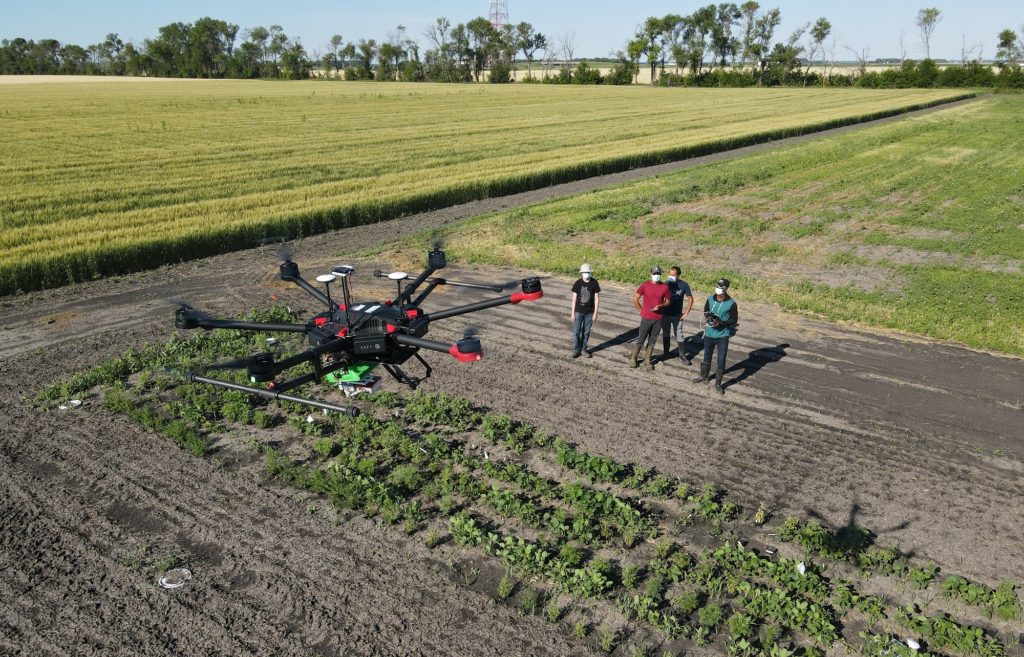
Rex Sun’s team of student researchers fly a drone as part of his Weedbot and AI research project. (Photo courtesy of Sun)
Those products will include “Weedbot,” an autonomous weed-identifying system developed by Xin “Rex” Sun, an assistant professor in agricultural and biosystems engineering at North Dakota State University (NDSU).
With Microsoft TechSpark donations of drones, computers and FarmBeats — a solution to harness data and artificial intelligence — Sun is developing robots rigged with cameras and sensors to detect and kill weeds with precision. He plans to expand his research to a Grand Farm test plot next year.
“I think North Dakota is the right place for precision agriculture, and now is the right time to do it,” says Sun.
He says Grand Farm, TechSpark, NDSU, government support and Fargo’s flat, open land all make the area ripe for innovation. He loves using Grand Farm as a classroom for his precision ag students, many of whom grew up with crop or livestock farming.
“They’re discovering that our agriculture and biosystems engineering program is a path for new and exciting careers,” Sun says. “Long story short, they are the next generation of farmers.”
El Paso, Texas, and Ciudad Juárez, Mexico
In the combined TechSpark region of El Paso, Texas, and Ciudad Juárez, Mexico, manufacturing dominates the economy through assembly plants and low-wage jobs. The region’s distance from tech-rich cities and the global headquarters of companies that own the plants makes it tough for startups to claim a larger part of the massive manufacturing market.
But the Bridge Accelerator, a partnership between TechSpark and Technology HUB, a binational business incubator, is making inroads. More than 20 companies have gone through the program and learned how to think globally.
“A lot of them are doing amazing work, but they’re only selling locally,” says Ricardo Mora, CEO of Technology HUB, which is based in both Juárez and El Paso. “We’re saying, ‘Listen guys, we’re going to train you, and you’re going to learn how to sell to global companies.’”
The region’s cross-border identity is a source of strength, with a young, largely Hispanic population of people who understand cultural differences, are often dual citizens and “want to make better opportunities for themselves every day,” says J.J. Childress, Microsoft TechSpark manager in El Paso.
“This is truly a binational effort,” he says of the Bridge Accelerator. “How do we create a soft landing for companies that want to access Latin American markets? How do we take the innovation from Mexican companies and give them access to North America?”
The training helped Rene Pons, an entrepreneur in Chihuahua, Mexico, meet a community of like-minded businesspeople and learn how to approach global companies.
“For a startup, a really huge problem is connecting with a big corporation and having them trust you,” says Pons, who co-founded PPAP Manager, maker of a digital solution that helps streamline automotive supply chains. He says establishing trust with global customers is even harder for companies in Mexico, which isn’t known for digital innovation.
“The Bridge Accelerator is opening the door to start conversations and getting an opportunity to be trusted,” Pons says.
Southern Virginia
The tiny town of South Boston, Virginia, hasn’t seen new construction in nearly 40 years, so the rise of a new building where tobacco warehouses once stood is exciting news.
Even better is that it will house the SOVA Innovation Hub, a partnership between TechSpark and Mid-Atlantic Broadband Communities, whose open-access fiber networks have provided broadband access to help bridge the digital divide in southern Virginia. The building will house the nonprofit’s headquarters, a Microsoft experience center and space to help digital skilling nonprofits. That’s good news for an economy built on manufacturing and still struggling with the loss of tobacco and textile industries.
“Job stability is very difficult. Internet access is difficult. There’s a tremendous amount of poverty,” says Paul Nichols, superintendent of Mecklenburg County Public Schools.
The majority of his students qualify for a free or reduced lunch, and while fiber networks have changed the commercial landscape, many residents still don’t have broadband.
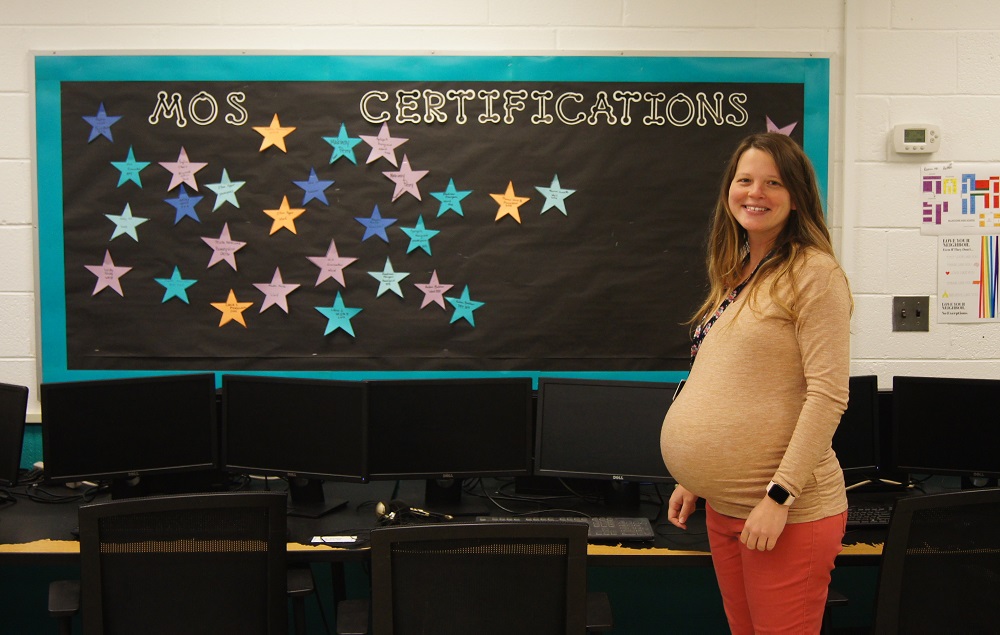
Krystal Patton teaches programming and Microsoft Office Specialist (MOS) certification courses in Mecklenburg County with the support of TEALS. (Photo courtesy of Paul Nichols)
“It’s like years ago when we had the same issue with electricity in rural areas,” Nichols says.
He’s looking forward to the economic investment and is grateful he’s been able to offer high school computer science classes with the support of Microsoft’s TEALS program. The classes help students think creatively to solve problems in all subjects, not just computer science.
“It’s challenged students to think and learn in a new way,” Nichols says. “With technology being foundational for all careers, we’re now looking at how to make computational thinking a part of all of our classes.”
One of the major goals of TechSpark is making sure everyone has the opportunity to engage in the digital economy.
Central Washington
In central Washington, Microsoft TechSpark Manager Lisa Karstetter serves a vast agricultural region where a third of the residents don’t speak English and 36,000 adults have no high school degree. Her goals include creating more opportunities to transform businesses and reskill people who have only known work in orchards, fields and processing plants. It’s a big job, but Karstetter feels honored to do the work.
“I need my tide to rise so it lifts all boats,” she says.
One of those boats belongs to Jayr Gudino, whose parents emigrated from Mexico to Quincy, Washington, for a better life. That has meant processing potatoes for his mom and picking apples and driving a cement truck for his dad. Gudino remembers watching his parents come home exhausted after 12-hour shifts and telling him to study.
“My parents always pushed me to work hard in school,” says Gudino. “There’s nothing wrong with what they do, but they wanted me to have an opportunity to do something more.”
Surrounded by agriculture, he didn’t know what “more” existed until he discovered coding through computer science classes supported by TEALS. He’s now a sophomore considering an informatics major at the University of Washington in Seattle.
“If it wasn’t for TEALS, I really don’t know what I’d be doing right now,” says Gudino, who knows many classmates who went straight to work in the fields after high school. “Having TEALS in school showed me what else is out there in the world. It gave me the opportunity to learn and put my foot in the door for something I wanted to do in the future.”
For Microsoft TechSpark Senior Director Egan, partnership has been the key to every community engagement.
“Find the right partner in the region, trust and empower their work, and collaborate for impact,” he says. “TechSpark’s mission remains sustained economic growth, with the added benefit of our learning and added knowledge through these regions.”
To learn more, visit Microsoft’s TechSpark.
Lead image: Reegan Ford in Cheyenne, Wyoming (photo by Rachel Woolf)


